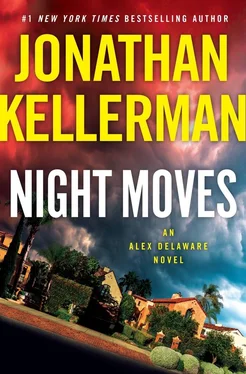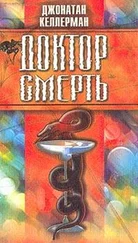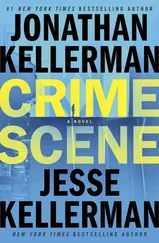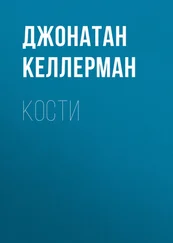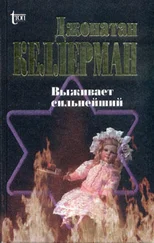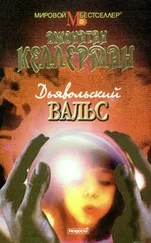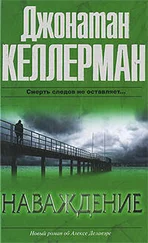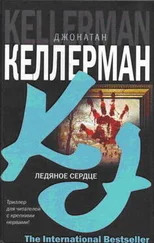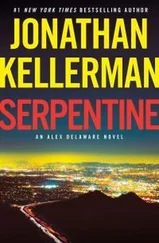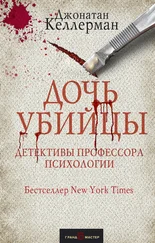Milo said, “Ain’t that the truth.”
I said, “No streetlights, must get pretty dark at night.”
Ahearn said, “With no stars or moon it’s a total blackout. You’re figuring your boy’s been coming and going at night?”
“Maybe when Brassing surprised him. Any idea what time of day that happened?”
“Still waiting on the pathology, Doctor, but you’ve got a point. For sure Brassing was shoved off that cliff in the dark. That section of 18 isn’t always traveled heavily but there’s always some day traffic, you couldn’t count on not being seen.”
Milo said, “A fire would be more visible at night but no one reported any.”
Ahearn knitted his fingers and cracked his knuckles. “If it was timed right — two, three a.m., put the car in neutral, soon as it starts rolling, toss the match, it could’ve been mostly shielded from view. And the arson guy says the fire was brief, not successful if evidence destruction was the goal. Most of the scorch marks were in the rear section of the Rover and that’s where they found the accelerant splashes. The body was damaged but not burned up so it weakened as it moved forward. I’d still bet on a night thing.”
He unfolded his hands, stretched a few fingers, and produced more pops. “Something’s bound to come up.”
Milo said, “You’re an optimist.”
“I’m a realist. Or as my college son says, a surrealist. Whatever that means. Kid wears black, is writing one of those plays where they dance around like who-knows-what.”
He laughed. “Kid used to like football.”
One of the techs emerged. “We smell bleach, Lieutenant, but so far no visible blood or bloody swabs. But there’s a lot of area and with all the glass and no drapes it’s too bright for Luminol.”
“You’ll do it after dark.”
“Someone will, sir. The next shift.”
“Don’t want any communication issues,” said Ahearn.
“There shouldn’t be any, sir.”
The tech returned inside.
Ahearn faced us. “It’s all about communication, right? That’s always what goes south. So what else should we talk about?”
Milo said, “Who does what.”
“One of ours goes down, it’s ours. We’ll handle everything in our jurisdiction.”
“Fair enough, Al.”
“No one will screw up.” He walked us to the unmarked, specified his plan. Nervous, like a kid delivering an oral report.
The house and yard would be processed “to the nth,” including the use of infrared sensors and cadaver dogs. The neighbor to the rear would be contacted and if an informal request to process the forest wasn’t granted, a request for a warrant would be submitted to “the best judge I can find.”
Ahearn would also make sure all the hotels where Chet Corvin had stayed would be re-contacted about sightings of the Weylands.
I said, “Expanding to some of the nearby motels might be a good idea.”
Ahearn’s glance at Milo said, This one’s full of ideas.
Like the true friend / ace detective he is, Milo said, “He means the whole synchrony thing. Mearsheim did Corvin in a cheap motel, maybe he stalked him at others but the situation wasn’t right.”
Ahearn said, “Cheapie dump... we’ve got our share of those. I’ll try. Anything else?”
Milo said, “Be on the lookout for Cory Thurber, the kid in the Camaro.”
“You see him as a suspect or a potential victim?”
“At this point, victim makes more sense. But Mearsheim’s likely to have an accomplice, so who the hell knows?”
I said, “With Donna out of the picture, the accomplice could be the new woman in Mearsheim’s life.”
Ahearn said, “He trades them in, huh?”
Milo said, “More like sends them to the wrecking yard.”
Milo fidgeted as he raced toward Arrowhead Village. “Not sure what that accomplished.”
I said, “At least the house will finally get worked.”
Three miles passed before he spoke again. “Seven years between Jackie and Donna.”
“Good chance of someone else,” I said. “When did he marry Donna?”
“Good question. Call Moe, see if he can find out.”
I phoned Reed, got voicemail, left a message.
“Try Sean.”
Same result.
Milo said, “It’s like everything’s turned swampy and just walking’s a hassle — try Petra.”
The third time wasn’t a charm.
Without waiting for further instruction, I phoned Raul Biro.
He said, “You’re on the Loo’s phone, Doc.”
“He’s into safe driving.”
“Driving from where?”
I told him.
He said, “A cop? Oh, shit. And you think it’s the same guy who did the handyman — Weyland.”
“Best guess, so far. His real name’s Mearsheim. Maybe.”
“Whatever his name is, I might have something. When do you plan to be back?”
“Couple of hours.”
“That’ll work,” said Biro. “Got someone you’ll want to meet, listen to this.”
Fueled by the news, Milo sped well past the limit, making adventurous lane changes, and when we reached the jam near the four-level downtown interchange used the shoulder to press his way onto the 101.
Ignoring honks and dirty looks, he said, “Goddamn pretzel and they don’t even give you salt.”
Squealing exit followed by more creative driving on side streets.
When we pulled up in front of the Hollywood station on Wilcox, Biro was waiting. GQ ’d as always in a light-blue suit, white shirt, Windsor-knotted paisley tie. But the look in his eyes was anything but composed. He remote-opened the staff lot and sped ahead of us as Milo sandwiched between two other sedans.
“Thanks for sticking with it, Raul.”
“Petra’s idea,” said Biro.
“How’s she feeling?”
“Sick as a dog — more like a flu than a cold.” Biro looked at his watch. “You made it unbelievably fast.”
“Luck,” said Milo.
Biro said, “I’ll bet.” His right foot moved up and down as he scanned the street. “A little late. He doesn’t show up, I know where to find him.”
A minute later, a white taxicab trimmed in blue and red approached from the south. Prestige Cabs above a medallion impressive enough for a minor European functionary.
Biro pointed the cab to the staff lot, remoted it in. By the time the cab had parked, we were at the driver’s door. A short, wide man in a gray cardigan got out. Sixties, sparse white crew cut topping a face that looked as if it had spent years in the ring, a physique designed for trudges across the steppes.
Biro said, “Hello, Mr. Grinshteyn. Thanks for coming.”
“Boris,” said the driver.
Milo extended his hand. “Lieutenant Sturgis. Thanks for taking the time, sir.”
Boris Grinshteyn hesitated before shaking, as if concerned about digit theft. His fingers were cocktail franks. “The please say come, I come.”
Bassoon voice, Russian inflection. I flashed back to a record favored by my “educated” aunt Edith. Peter and the Wolf.
Biro said, “We really appreciate it, sir. You brought what we need?”
“Yah, Lieutenant.”
“He’s the lieutenant, I’m just a lowly detective.”
Grinshteyn’s face compressed, taking on the look of a cabbage left too long in the fridge.
Milo said, “He’s being modest. He’s a commissar.”
“Hoh,” said Grinshteyn. “Commissars we don’t need.”
He key-opened his trunk, took a while finding what he was looking for among piles of laundry and Cyrillic-lettered magazines.
Finally, he handed Milo several loose sheets of paper, dog-eared and stained by what looked like tea.
Logs, written in a shaky, Old World hand.
“A week of driving I brought you,” he said. “Company made me photocopy before I give you.”
Читать дальше
